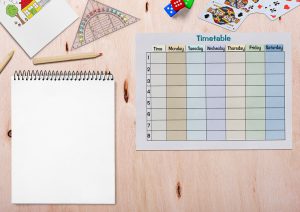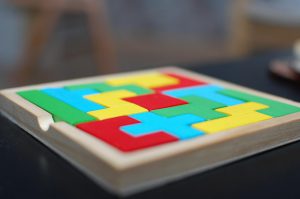When’s the last time you found yourself skipping down the street, or getting lost in the world of your imagination? Maybe that’s not even something you’ve thought about since reaching adulthood, but what about your kids? When was the last time they just plain played – no screens, no homework, no worries, and nothing to keep them from the pure unadulterated joy of childhood?
If you’re not sure, don’t feel stressed: so many families nowadays find themselves drowning in homework, work, extracurricular activities, and just everything that modern life seems to throw at us every day. But consider this a wake-up call! Summer is ending and the school year will soon be in full swing, so take this time to rediscover for yourself why play is so important, and then try to bring some unfettered fun back into your kiddos’ lives!
The Decline of Play, or All Work and No Play…

Think back to your childhood, or ask your parents about theirs. Then think about the way your children spend their time. At first, you might think that your kids play a lot. They have more toys than we did, they have an endless source of crafts ideas on Pinterest, and all sorts of “play spaces” to head to. They can also enjoy a huge range of extra-curricular activities to make them more “well-rounded,” like piano, football, swimming, coding, or all at once. Not to mention all of those “educational” screen games to play.
But then think about the amount of time you and your parents spent in play that wasn’t directed by adults, or was totally unstructured and completely created by your imaginations. You might notice a little bit of a difference – or maybe even a big difference. While you or your parents might have fond memories of exploring with friends on a long summer day, not a grownup in sight, you might shudder at the thought of leaving your children unattended for hours.
And how about school? Remember those seemingly endless recess periods (or maybe they seemed too short at the time!) and free play times in the youngest grades? Now think about your children and their seemingly endless homework worksheets and standardized tests. School has become less and less about play and being a child, and more and more about structure and goals; even the way we parent has gone down the structures and goals route, as we scroll through social media and feel anxious about what our children “should” be doing by what age, and feel pressured to get them involved in every activity under the sun.
So you probably won’t be surprised after thinking about all of this that there are actually studies that show that “free play,” defined as “play a child undertakes him- or her-self and which is self-directed and an end in itself, rather than part of some organized activity,” has been steadily declining over the decades. In fact, according to an older but often-cited study, researchers found that compared to children in 1981, children in 1997 spent less time in play and had less free time. They spent 18% more time at school, 145% more time doing school work, and 168% more time shopping with parents. The researchers found that, including playing on computers, children in 1997 spent only about eleven hours per week at play.
And that was 1997! Anecdotal studies tell us that play has declined even more since then, especially since the explosion of even more “screen time.” Experts continue to recognize that the decline of play is a real, and distressing thing: in fact, according to a special report by the Genius of Play entitled The State of Play in America, the following six factors contribute to the current decline of play:
- Overly structured schedules
- Too many extracurricular activities
- Increased screen time
- Decreased recess time in school
- Competitive parenting culture
- Parental buy-in and support for play
Evolutionary biologist Dr. Peter Gray, a famous advocate for the return to play, agrees with the above, but also adds that many parents and educators have a view of child development that comes from a belief that kids need to constantly be learning in a structured way, meaning we usually think that kids learn more from adults, as opposed to from other children through play. Play can often, unfortunately, be seen as trivial and unproductive, or a distraction from the serious business of studying and passing tests.
Of course, these beliefs are not necessarily ones that we articulate: in fact, it’s not that anyone set out to do away with free play time. But its value has not been recognized. As a result, kids’ free play time has not been protected, which could actually be doing them more harm than we think.
For example, in a 1997 study of children living in poverty, researchers looked at kids who were enrolled in play-oriented preschools, and others who attended play-free preschools where teachers structured every activity. When they tracked these kids into adulthood, they concluded that those who enjoyed unstructured playtime in childhood (the first group) were more socially adjusted later in life. Not only that, but Dr. Grey also says that in his research, he saw a strong correlation between the decline of play and increased mental health issues in young people, including an uptick of suicide in adolescents and teens.
So why is play so important, and what can we do to bring the magic of imagination back into our kids’ lives?
The Importance of Play
Pioneering educator Friedrich Froebel is famously quoted as saying all the way back in the 19th century, “Play is the highest expression of human development in childhood for it alone is the free expression of what is in a child’s soul.” Since then, many experts on childhood development have sung the praises of play, calling it the important “work” of childhood. And that is 100% true! Play is how children learn about the world, themselves, and each other. It’s as much a part of healthy development as eating vegetables, reading books together, and getting a good night’s sleep. Even the United Nations lists play as one of the basic rights of every child.
What is it exactly that play does for children as they develop? Unstructured play:
- Teaches children how to solve problems and make decisions
- Help children figure out how to exert control, which means they will not grow up feeling like victims of circumstance, and will be less prone to the anxiety and depression that can come from feeling like they don’t have control over their own lives
- Gives children an understanding of how to follow directions
- Allows children to find their own self-identified and self-guided interests without worrying about goals, grades, or adult praise
- Fosters cognitive development, since it strengthens and increases neural connections in the brain (the paths we use for thinking), as well as the prefrontal cortex (the area that influences the way a child learns, solves problems, and gains knowledge about their environment)
- Helps reduce stress and irritability, while boosting joy and self-esteem
- Promotes physical fitness, helping to sharpen reflexes and improve balance, motor skills, and bone density
- Gives children a way to handle their emotions, like anger and fear, as they put themselves in physically and socially challenging situations
- Also gives them a way to name and validate complicated emotions
- Fosters friendships, and allows children to see each other as equals
- Makes children happy!
We know that play has all of these intensely positive effects. We also know that not giving our children the unstructured play time that they need can, in the best cases, mean that we need to spend more time on helping children develop language, communication, social-emotional intelligence, and resilience. And in the worst cases, we know it can lead to things like depression, difficulty adapting to change, poorer self-control, and shallower interpersonal relationships. So what can we do? The answer is simple: let’s get back to playing!
Putting the Play Back into Our Lives
Sure, it sounds so simple: just play. Right? But it’s ok to admit that we need a little reminder on how to encourage unstructured play. So try the following:
- Make sure to give your children time to be bored and to have to entertain themselves
- Remember that often, when it comes to toys, the simpler the better, so children can decide what they want to do with them
- Go outside!
- Play with children on their own terms, let them take the lead, and allow them to negotiate and communicate in their own way
- Set and maintain boundaries surrounding technology – and model good behavior with your own devices
- Give your children time alone
- Allow your children to solve their own problems whenever possible
It can be hard to just let go, we know. But taking a step back, relaxing, and giving up some control while allowing your children to lead, learn, and discover independently and collaboratively through play can be freeing for your child and you. They might look like they’re just filling up time with random enjoyable activities, but they will be developing all of the social, emotional, and cognitive skills they need to become happy and successful adults, and you won’t feel like you have to constantly entertain them. You can just enjoy watching their creativity and joy in action – and you might even save some time and money when you feel less pressured to schedule activities for every free minute your child has! We want to hear from you: does unstructured play play a big role in your household? Or maybe you’re ready to take some of the structure out of your family’s life – how will you do it?
